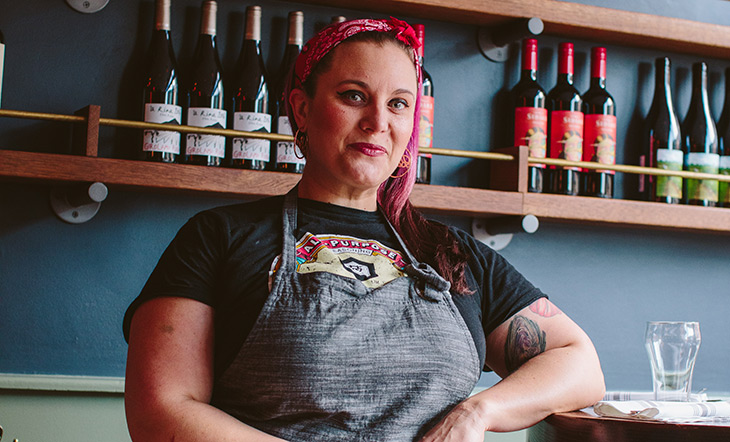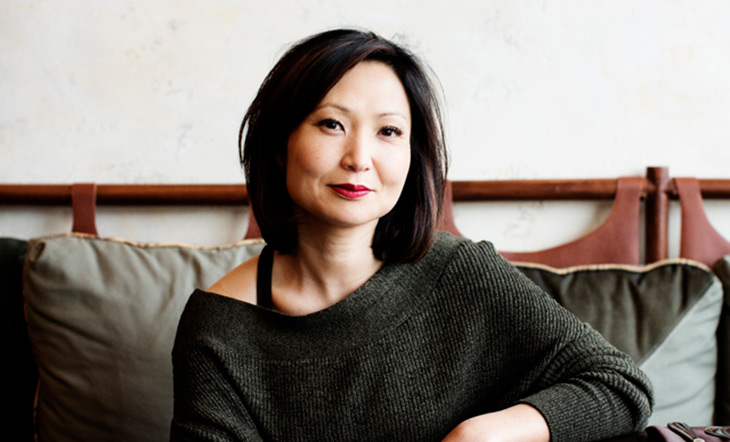How These Chefs are Surviving COVID-19
We caught up with chefs from our A Regional Taste series on how they are handling the pandemic
Morgan CarterOctober 23, 2020
As our industry faces an uncertain future in the months and years to come due to COVID-19, the James Beard Foundation is committed to helping restaurants re-open, rebuild, and thrive. Before the pandemic, chef Antonia Lofaso met with James Beard Award-winning chefs from all across the country—hailing from Boston, Minneapolis, New Orleans, Oxford, Mississippi, and Seattle—and they showed us their favorite hometown spots for A Regional Taste presented by Capital One. To culminate the series, we followed up with these chefs to see how they have responded to the pandemic and how you can help.
Karen Akunowicz, chef/owner of Fox & the Knife, Boston

When the coronavirus first sent a shockwave of closures throughout Boston, Karen Akunowicz quickly revamped the structure of her flagship restaurant Fox & the Knife. “In under 48 hours, we pivoted from our regular, busy dinner service to a takeout model, plus a fully branded new business, Fox Pasta, a wholesale fresh pasta company.” Churning out over 75 pounds of pasta a day and working tirelessly alongside her management team, Akunowicz has committed to keeping her restaurant open to “continue to be the neighborhood place we promised we would be.”
While her ingenuity and her staff’s tenaciousness have kept the doors open since the pandemic, she admitted that sales are down by half and rent and taxes are always a top concern. For long-term relief, Akunowicz supports the RESTAURANTS Act of 2020. “Congress needs to take urgent action to ensure that independent restaurants and workers are able to re-open our doors, reunite our communities, and reignite our economy as we come out of this crisis,” she said.
The bill still faces an uncertain fate, so for now Akunowicz finds solace in the kindness of her customers.
“Every day our neighbors come in and share stories that make me cry. They tell us that during the darkest days our food gave them a sense of normalcy, or made a special occasion feel special,” she says. "There is the heart [that] small, independent businesses bring to a community and the soul that we foster, even in these unprecedented times.”
Vishwesh Bhatt, executive chef of Snackbar, Oxford, MS
After a brief closure in March, Vishwesh Bhatt’s Snackbar was consolidated with City Grocery and Big Bad Breakfast—all part of James Beard Award winner John Currence’s City Grocery Restaurant Group—into one operation, Big City Snack. Operating out of Big Bad Breakfast, the joint venture included pick-up and delivery items from all three concepts, ready-to-go family meals, and “City Groceries” which offered pantry staples and coveted toiletries including hand sanitizer and toilet paper. Bhatt kept things interesting with Happy Hour boxes brimming with oysters and wine and his famed fried chicken brined in sweet tea. As restrictions began to lift, Snackbar returned with outdoor dining and socially distanced indoor dining this past June.
Nina Compton, chef/owner of Bywater American Bistro and Compère Lapin, New Orleans

Back in mid-March, Nina Compton and her husband and business partner Larry Miller were on the cusp of planning the two-year anniversary of Bywater American Bistro. A few days later, both of Compton’s restaurants went dark due to government-mandated closures. Though Compère Lapin has remained closed since March, Bywater American Bistro switched to a takeout business with a rotating roster of themes from a fish fry to a drive-thru Caribbean jerk pop-up. But as dining restrictions began to lift in May, Compton was careful to return. Booking only one table a night starting in June, Compton cautiously re-opened with strict protocols in place.
“Restaurants have been suffering since the pandemic first hit, but I think that now, we have been able to slowly get back on our feet. We are taking measures to make sure our restaurants are safe, from staff and guest temperature checks to having sanitizer easily accessible throughout the restaurant,” she said.
While she directs people to the RESTAURANTS Act of 2020 as a way to support her businesses and the industry as a whole, she cites that the community's collaborative spirit has helped to keep her going. “We are a very close community. Whether through donations, political actions, or just lending a helping hand, it’s very inspiring to see the community come together. People in New Orleans have been through a lot together and the only way we can all survive is to help each other.”
Ann Kim, chef/owner of Pizzeria Lola, Hello Pizza, and Young Joni, Minneapolis

On top of managing three restaurants during a pandemic—and in the process of opening a fourth later this year—Ann Kim added another title to her plate, becoming a founding member of the nonprofit Twin Cities Restaurant Coalition. Composed of over 40 hospitality professionals and leaders in Minneapolis and St. Paul, the group advocates for “the health and prosperity of independent restaurants and bars in the Twin Cities” by supporting the RESTAURANTS Act of 2020 and providing resources to the industry.
With her restaurants still only open for takeaway and delivery for the foreseeable future, Kim is taking the pandemic day by day. “Back in March, we made a commitment to prioritize the health and well-being of our team members, guests, and community. We are in constant conversation with our teams to understand how they're doing, what they need, and how we can improve.”
But as indoor dining begins to resume for a number of restaurants across the country, Kim reminds diners to “be open, compassionate, and understanding. Restaurant experiences look and feel different than they did pre-COVID. Every restaurant has different challenges and we are doing our best to navigate our way through this.”
And when in doubt, follow the rules. “Make a list of your favorite five independently owned restaurants and order from them as often as possible. If you are comfortable dining out, please do so safely by following the rules and guidelines that restaurants have put into place to keep their teams and guests safe.”
Brady Williams, executive chef of Canlis, Seattle
In mid-March, Brady Williams and the team at Canlis announced they were closing their fine dining concept in lieu of takeout and delivery concepts. “Exercising a different muscle as we pivot to a few new concepts,” Williams wrote in a social media post. “Fine dining isn’t what this city needs right now. Instead, this idea provides safe and secure jobs for our staff, while maintaining support for our loved farmers and producers during this time of lost business and uncertainty.”
Clearly not everyone was thrilled with the news—the restaurant received a tweet, “Oh, great. Now I can get that lukewarm tweezer food delivered?!” Instead of balking, the Canlis team slapped the phrase “Delivering Lukewarm Tweezer Food Since 2020” on a t-shirt and used the proceeds to benefit their restaurant and workers.
Canlis has since launched 10 different concepts over the course of the pandemic, ranging from a burger drive-thru (where they sold an average of 1,000 burgers a day) to a CSA program stocked with fresh produce from growers and producers, to their latest venture: Canlis Community College. Rooted in a core curriculum of food and wine, the six-week project includes online culinary classes from Boxed Wine 101 to cooking lessons with Williams and various Seattle culinary figures. The project also includes non-culinary classes (cheekily billed as electives and office hours) including aerobics streamed from the dining room and the Canlis Kids Show, a weekly show featuring Mark and Brian Canlis as they tour the Seattle Aquarium and Woodland Park Zoo.
Learn about our efforts to help independent restaurants #openforgood.




-57 web.jpg)


